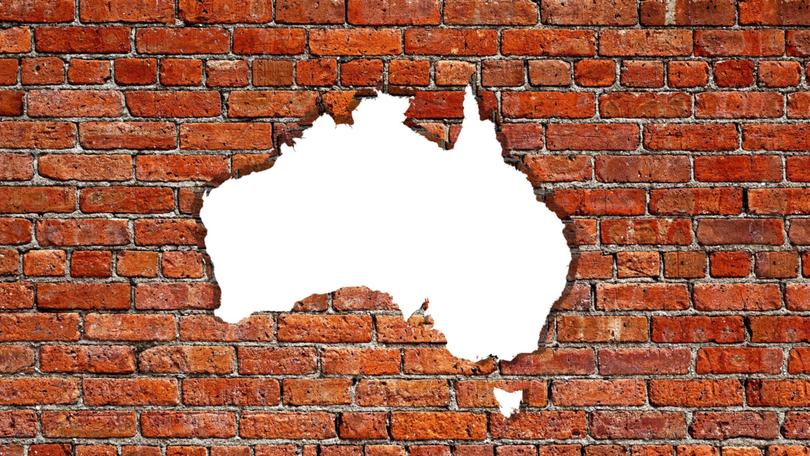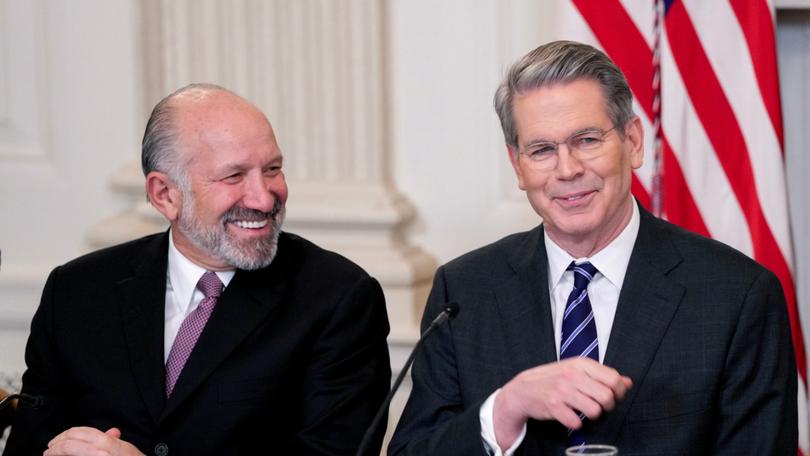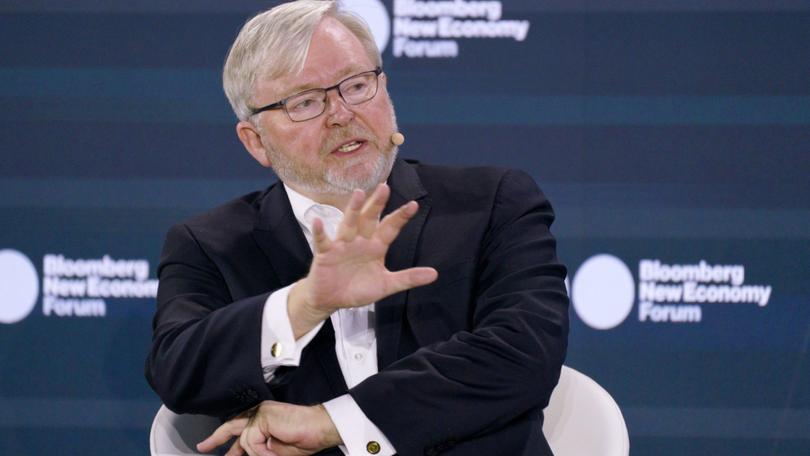Australia’s quiet attempts to catch a break in Donald Trump’s tariff wall
Labor continues to keep its cards close to its chest on attempts to secure a carve-out from the United States’ punishing new trade tariffs regime.

Labor continues to keep its cards close to its chest on attempts to secure a carve-out from the United States’ punishing new trade tariffs regime, only saying backroom diplomacy is ongoing in Washington to argue Canberra’s case for an exemption.
The Nightly understands that Ambassador Kevin Rudd, who is said to be plugged in with the inner circle of the Trump administration, including Secretary of Commerce Howard Lutnick and Treasury Secretary Scott Bessent, is continuing to lead a complicated and multilayered response.
It remains unclear, however what that entails. Mr Rudd has not spoken publicly about his efforts in the run-up to US President Trump’s “Liberation Day” last week or since.
Sign up to The Nightly's newsletters.
Get the first look at the digital newspaper, curated daily stories and breaking headlines delivered to your inbox.
By continuing you agree to our Terms and Privacy Policy.“Australia continues to engage with the US. The Prime Minister has been clear, we won’t compromise on the things that matter to Australia including the PBS and our biosecurity,” said a Government spokesperson.
Officials have dismissed reports that negotiations are on ice until after the May 3 election, with industry sources and experts suggesting the timing of the poll actually works in Australia’s favour by allowing more time to strategise.
Australia faces a 10 per cent “baseline” levy on all exports to the US, with the most severe taxes of up to 49 per cent being slapped on regional neighbours like China, Malaysia, Vietnam and Cambodia.

One of the main obstacles the country faces, along with others impacted by Donald Trump’s Liberation Day, is the US administration’s lack of clarity about the starting point of negotiations and what it wants in return for dropping the tax.
The prevailing view in Canberra circles is to tread carefully and persistently and not to rush into a position where Australia could be pressured to give too much away.
World leaders have scrambled to respond since Donald Trump’s “declaration of economic independence” in the White House Rose Garden last week triggered losses in markets in Asia, Europe and the US.
But amid the wide range of responses, no country has yet scored a beneficial deal.
On Monday, the 27-nation European Union, which was slapped with a 20 per cent rate on all goods, struck back with 25 per cent tariffs on some US imports after initially offering a “zero-for-zero” tariff arrangement to avert a trade war.
The list was shortened after Brussels bowed to pressure from member states and removed bourbon, wine and dairy to avoid the threat of an escalatory 200 per cent counter-tariff on EU alcoholic drinks.
Canada, which faces a 25 per cent tax on cars and car parts, took a different tack by initiating a World Trade Organisation dispute against the move.

Israel’s Prime Minister Benjamin Netanyahu flew directly to Washington to try to persuade Mr Trump personally to back down over a 17 per cent levy, while Indian Foreign Minister Subrahmanyam Jaishankar posted on social media that talks were afoot with US Secretary of State Marco Rubio on a bilateral trade pact.
British Prime Minister Keir Starmer told reporters his government would “keep calm and fight for the best deal” while also suggesting a more coordinated approach “with our key partners to reduce barriers across the globe.”
Mr Starmer and Australian Prime Minister Anthony Albanese, who enjoy a strong relationship, held a phone call on Friday to discuss how to tackle Mr Trump’s decision to upend the global trading regime.
It is understood that Australian and British officials are also in close contact with each other.
While many countries have chosen to be vocal about their strategies to retaliate or negotiate, beyond condemning the US move as “unwarranted” and ruling out reciprocal tariffs as too damaging, Mr Albanese has given little away about Labor’s response.
Determined to focus on spruiking the Government’s healthcare and cost-of-living pledges, the Prime Minister has shut down questions at press conferences about his administration’s engagement with the White House.
Mr Trump has become an unwelcome presence in the Federal election campaign that Labor would rather avoid.
But it has also been suggested that Australia’s refusal to beat its chest at the Oval Office has been determined to be the best tactic.
Andrew McKellar, CEO of the Australian Chamber of Commerce and Industry (ACCI) told The Nightly “it would have actually been potentially counterproductive to be sticking your head above the parapet and trying to directly call in favours.”
There were reports of some who tried, and for whom it didn’t work, he cautioned.
“We’ve seen the direction from the top. We’ve had good engagement with Don Farrell as trade minister. We’ve had direct contact with Kevin Rudd and the team in Washington, DFAT have been strongly engaged. They’ve had their best people on it,” he said.
“I think they’ve attempted to cover off all the angles in the US administration, in terms of representations that could be brought to bear,” said Mr McKellar.
“We’re comfortable that they’ve draw the line where they needed to. They’ve offered up constructive ideas. What’s very clear is there was no escaping from what’s been put in place.”
Mr McKellar downplayed the impact of the election on Australia’s negotiations, adding there would be an “appropriate” moment for leader-to-leader discussions to “press for further reconsideration.”
Arthur Sinodinos, who served as Australian ambassador to the US in the last Trump presidency, said while diplomats would be working from earlier instructions and unable to break new ground during the pre-election caretaker period, this was not necessarily a disadvantage.
“Whoever comes out of this election as prime minister … they then have the authority of having won the election to go to Washington, eyeball the president, and talk about issues and how they might work together,” he said.
“I think Australia’s current strategy is one of previewing possible negotiation, but also undertaking adaptation, in the sense of looking at how to ease the adjustment for affected sectors.”
Dr Jenny Gordon, former chief economist at DFAT, said there were no easy answers when faced with a US trade formula that was “completely meaningless,” suggesting that “collective action” was the best way forward.
“We’ve seen a rush of countries beating a path to the Trump administration to try and secure their own deal,” but it had made no difference so far, she said.
Post election would be “perfect timing” to gather more information about “whether other countries have managed to get serious reductions in tariffs for making minor concessions,” she said.
At this point, the new Prime Minister could enter the scene with a fresh mandate for talks.
“In some ways, the election is almost fortuitously timed to stop us going and making stupid concessions.”

